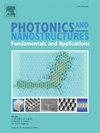利用等离子波导分离和激发光子晶体奇数和偶数模式的混合模式分离器
IF 2.9
3区 物理与天体物理
Q3 MATERIALS SCIENCE, MULTIDISCIPLINARY
Photonics and Nanostructures-Fundamentals and Applications
Pub Date : 2024-10-26
DOI:10.1016/j.photonics.2024.101323
引用次数: 0
摘要
本研究通过光子晶体波导与金属-绝缘体-金属质子波导之间的新型耦合机制,介绍了一种模式分离器。值得注意的是,所提出的结构展示了在光子晶体波导内激发奇数和偶数模式的能力。我们使用有限差分时域(FDTD)方法对该结构进行了数值模拟。我们的数值分析表明,在波长为 1550 nm 时,波导交叉点的透射率高达 95%。等离子体波导与光子晶体波导的成功耦合为设计创新设备提供了大量机会,这些设备可利用表面等离子体和光子晶体的独特特性所产生的协同潜力。这种设计的固有优势在于其拓扑结构简单,可实现经济高效的精确制造工艺。这种装置能够精确分离和识别输出模式。此外,我们还利用这种耦合器设计了一种高效功率分配器,不仅实现了高透射率,还提供了对输出功率电平的可调控制。本文章由计算机程序翻译,如有差异,请以英文原文为准。
A hybrid mode splitter for separation and excitation of photonic crystal odd and even modes using plasmonic waveguides
This study introduces a mode splitter through a novel coupling mechanism between photonic crystal waveguides and metal-insulator-metal plasmonic waveguides. Notably, the proposed structure demonstrates the capability to excite both odd and even modes within the photonic crystal waveguide. Numerical simulations of this structure were conducted using the finite difference time domain (FDTD) method. Our numerical analysis reveals an exceptional transmittance of 95 % at the waveguide intersection for the wavelength of 1550 nm. The successful coupling of plasmonic waveguides to photonic crystal waveguides unveils a vast array of opportunities for designing innovative devices that harness the synergistic potential arising from the distinctive characteristics of surface plasmons and photonic crystals. An inherent advantage of this design lies in its simple topology, enabling cost-effective and precise manufacturing processes. This device offers the ability to accurately separate and identify output modes. Additionally, we utilize this coupler in the design of a highly efficient power divider that not only achieves high transmittance but also provides adjustable control over the output power level.
求助全文
通过发布文献求助,成功后即可免费获取论文全文。
去求助
来源期刊
CiteScore
5.00
自引率
3.70%
发文量
77
审稿时长
62 days
期刊介绍:
This journal establishes a dedicated channel for physicists, material scientists, chemists, engineers and computer scientists who are interested in photonics and nanostructures, and especially in research related to photonic crystals, photonic band gaps and metamaterials. The Journal sheds light on the latest developments in this growing field of science that will see the emergence of faster telecommunications and ultimately computers that use light instead of electrons to connect components.

 求助内容:
求助内容: 应助结果提醒方式:
应助结果提醒方式:


